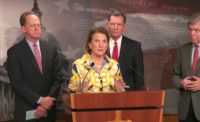Coronavirus and Construction
Senate GOP $1T COVID-19 Relief Proposal All But Omits Infrastructure
Senate Republicans have unveiled their opening proposal to begin negotiations with Democrats on a new coronavirus relief package.
The Associated General Contractors of America praised several provisions in the proposal, announced on July 27, including protection for employers from coronavirus-related lawsuits, an expanded tax credit for companies that retain workers and another round of funding for a recalibrated Paycheck Protection Program of forgivable federal loans.
[View Senate Finance Committee summary of bill's tax and unemployment insurance provisions here.]
But engineering and construction groups also say there is a big omission in the package: It has little or no immediate funding for infrastructure. It also has no mention of reauthorizing the federal highway and transit programs, whose existing five-year authorization lapses on Sept. 30.
Jeff Urbanchuk, a spokesman for the American Council of Engineering Companies, said via email that the legislation "needs a long-term component built around a multi-year infrastructure program." He added, "Real recovery must include infrastructure."
Senate Majority Leader Mitch McConnell (R-Ky.), speaking at a press conferece to roll out the bill, said the proposed legislation—the Health, Economic Assistance, Liability protection and Schools, or HEALS, Act, totals about $1 trillion.
Sen. Susan Collins (R-Maine) said the revised PPP would focus on small companies that have been hardest hit by the pandemic, including those in the hospitality industry. The new round of PPP loans would go to companies that received loans in the first round but whose revenue still is well below pre-pandemic levels. To be eligible, companies could have no more than 300 workers, compared with a 500-worker maximum in the initial round.
[View Small Business and Entrepreneurship Committee summary of PPP provisions in the bill here.]
Stephen Sandherr, AGC chief executive officer, said in a statement, "The measure also takes a more thoughtful approach than the existing [$600 per week] federal unemployment insurance benefit by protecting unemployed workers without creating artificial barriers to returning people to good-paying jobs in sectors like construction."
He is referring to the Republicans' proposal to essentially reduce the federal payment, initially to $200 per week. Some companies and Republican lawmakers contend that the $600 weekly payment encourages people to stay on unemployment rather than go back to work.
The release of the Senate GOP proposal now sets the stage for negotiations with Democrats, led by House Speaker Nancy Pelosi (Calif.) and Senate Minority Leader Chuck Schumer (N.Y.). Democrats laid down their marker 10 weeks earlier when the House passed the $3-trillion Health and Economic Recovery Omnibus Emergency Solutions, or HEROES, Act.
Among the HEROES Act’s main differences from the GOP's HEALS Act is its more than $900 billion in aid to state and local governments, which construction and engineering groups note can help preserve nonfederal funding for transportation and other infrastructure projects. The GOP plan has nothing similar.
On the other hand, the Democrats' plan doesn't include liability protection for employers, which McConnell has said is a "must" for Republicans.
The Democrats' bill retains the $600 weekly federal unemployment payment.
Airports are one of the winners in the Senate GOP package, and would receive $10 billion in Airport Improvement Program grants. The grants have historically been used to fund runways and other aviation infrastructure. But the new money in the Republican's measure could be used for operating expenses and debt service.
[View Appropriations Committee summary of bill's appropriations provision here.]
Other transportation sectors, notably highways and transit, were shut out in the Republican proposal.
State transportation departments, struggling with a drop in gas-tax revenue, have asked for $16 billion in fiscal 2020 and $37 billion over five years to help close the gap. The Democrats' bill has $15 billion for state highway programs.
Transit agencies, whose ridership has plummeted from pre-coronavirus levels, have asked for $23.8 billion. The Democrats' bill would provide $15.75 billion for transit.
One of the few construction items in the package is $1.75 billion to build a new FBI headquarters in Washington, D.C. McConnell said the White House "insisted" that it be included in the package.
The Trump administration in 2017 cancelled an earlier plan to move the FBI headquarters to the Washington suburbs. Under that proposal, a developer would build the suburban facility and gain the rights to demolish the FBI's deteriorating 46-year-old downtown building and develop the site. It is a prime parcel on Pennsylvania Avenue between the Capitol and the White House and cater-corner from the Trump International Hotel.
Veteran GOP lawmakers acknowledged their bill announcement is far from the final word about what may be the last coronavirus relief bill before the November elections.
Appropriations Committee Chairman Richard Shelby (R-Ala.) said at the press conference, "We all know this is Round One."
Story updated on 7/28/2020 with comments from American Council of Engineering Companies





